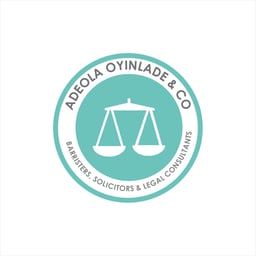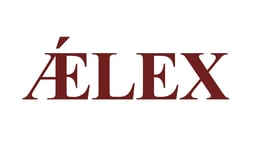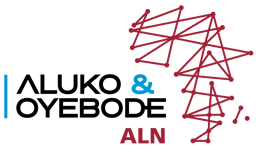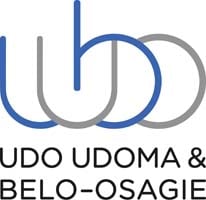
Nigeria
Directory


Adeola Oyinlade & Co

AELEX

Aluko & Oyebode

Bloomfield LP

Dentons ACAS-Law

DLA Piper Africa, Nigeria (Olajide Oyewole LLP)

Duale, Ovia & Alex-Adedipe

Foundation Chambers

G. Elias & Co

Odujinrin & Adefulu

Olaniwun Ajayi LP

Pavestones

Pinheiro LP

Templars

The New Practice (TNP)

The Trusted Advisors

Tope Adebayo LP

Udo Udoma & Belo-Osagie
Firms in the Spotlight

G. Elias & Co
We are a leading Nigerian business law firm founded nearly 30 years ago. We have always had an international outlook. We have a reputation for, and an outstanding record of, carrying out critical, inn

Adeola Oyinlade & Co
Adeola Oyinlade & Co. is a full-service law firm headquartered in Lagos, Nigeria. The firm offers a variety of legal services to a vast range of national and foreign clients.
The firm’s corpora
News & Developments
ViewCoporate Law
How to Set Up a Holding Company in Nigeria: A Comprehensive Guide for Investors by Olawunmi Ojo
A holding company remains one of the most efficient structures for investors—local or foreign—who want to centralise ownership, streamline governance and manage multiple businesses under a single entity. In Nigeria, holding companies are widely used across energy, manufacturing, fintech, real estate, hospitality and services. They are also commonly adopted by multinational groups seeking a stable corporate base for their Nigerian or West African operations.
Establishing a holding company in Nigeria requires thoughtful structuring, compliance with local regulation and a clear understanding of tax, corporate and immigration implications. Below is a detailed, practical guide for investors considering this route.
What a Holding Company Is (and Why Investors Use It)
A holding company is a corporate entity created primarily to own shares or assets in other companies. It typically does not engage in substantial day-to-day operations itself. Instead, it controls subsidiaries, manages group strategy, holds intellectual property, and serves as the investment and governance hub of a larger corporate structure.
Investors favour holding companies in Nigeria because they separate operational risk from core assets, centralise group decision-making, simplify fundraising at the group level, facilitate succession and ownership transfers and create a clearer governance and compliance framework
These advantages make the holding model attractive for both local conglomerates and foreign multinational groups.
Incorporating a Holding Company
The process begins with the Corporate Affairs Commission (CAC), Nigeria’s company registry. A holding company is most commonly incorporated as a Private Company Limited by Shares (Ltd). Standard incorporation requirements includes
proposed company name
registered office in Nigeria
details of directors and shareholders (foreign directors are permitted)
share capital structure and allotment
Memorandum & Articles of Association
The company’s objects clause should reflect its holding purpose (for example: acquiring, holding and managing shares or interests in other companies, holding intellectual property, and providing group oversight).
Minimum Paid-Up Capital
Under Nigeria’s current regulatory practice, companies with foreign participation are expected to have a minimum paid-up share capital of ₦100,000,000 (one hundred million naira). This requirement is reflected in the Revised Handbook on Expatriate Quota Administration and has been implemented in practice by regulators and service providers.
The ₦100 million threshold applies to companies with foreign participation and is a precondition for certain post-incorporation approvals such as business permits and expatriate quota applications.Regulators and banks typically expect the capital to be paid-up (not merely authorised). In many cases, only the portion owned by the foreign investor needs to be inflowed and evidenced, but practices can vary by bank and regulator so it is prudent to plan for full paid-up capital documentation. The Corporate Affairs Commission and immigration authorities have signalled enforcement through incorporation queries, post-incorporation checks and linkage to expatriate quota and business permits. Because guidance has evolved, many service providers treat this as a live requirement and advise compliance to avoid delays. Companies with foreign participation and paid-up capital below the ₦100 million threshold have been advised to bring their capital in line with the new threshold within regulatory timelines to avoid queries on future filings or regulatory actions.
Transferring Subsidiaries and Assets into the Holding Structure
After incorporation, a holding company can acquire shares in existing subsidiaries, inject capital into new operating entities, transfer intellectual property rights or take title to group assets. Each share transfer must be properly documented and reflected in subsidiary registers and CAC filings.
When foreign capital is imported, a Certificate of Capital Importation (CCI) issued by the receiving bank is critical for future profit and capital repatriation. Proper documentation of capital inflows helps smooth foreign exchange and tax processes.
Sector-Specific and Regulatory Approvals
If the holding company will own controlling stakes in regulated entities, expect regulatory approval processes. Regulators that commonly require change-of-ownership notices or approvals include:
Central Bank of Nigeria (CBN) for banks, payment services, and certain financial institutions
Nigerian Upstream Petroleum Regulatory Commission (NUPRC) for upstream oil interests
Nigerian Communications Commission (NCC) for telecoms licence transfers
National Insurance Commission (NAICOM) for insurance entities
NAFDAC or SON for pharmaceuticals and manufacturing
Securities and Exchange Commission (SEC) for companies operating in the capital markets
Regulatory timelines and documentation requirements differ across sectors; early engagement prevents transactional delays.
NIPC Registration and Investment Incentives
Foreign-owned holding companies should register with the Nigerian Investment Promotion Commission (NIPC). NIPC registration is important for formal recognition as an enterprise with foreign participation and for accessing potential incentives, clarifying repatriation rules and documenting the foreign investment for treaty protections.
Tax Considerations
A holding company offers tax planning opportunities but also attracts scrutiny on inter-company transactions. Key tax points:
Dividends: Dividends received by a holding company from Nigerian subsidiaries are generally exempt from further Nigerian tax if structured correctly.
Transfer pricing: Inter-company services, management fees and loans must meet arm’s length standards under Nigeria’s transfer pricing rules. Proper documentation is essential.
Withholding tax, VAT and CGT: These may apply in different circumstances and should be considered in structuring group flows.
Filing obligations: Holding companies must file annual tax returns and audited financial statements in Nigeria.
Immigration, Staffing and Corporate Governance
If the holding company will employ expatriates for group oversight roles such as group CFO, regional CEO or technical directors ensure you obtain:
Business Permit from the Ministry of Interior (where applicable)
Expatriate Quota approval for specified roles
STR/CERPAC and visa regularisation for incoming expatriates
A holding company is an ideal place to centralise group policies on governance, risk management, compliance and HR. Centralised policies help harmonise standards across subsidiaries and make regulatory reporting more straightforward.
Why Investors Choose Holding Structures in Nigeria
A properly structured holding company supports streamlined fundraising at the group level, asset protection and separation of liabilities, easier portfolio reorganisation or exit planning, consolidated governance and reporting and efficient expansion and brand management across sectors
These benefits explain why many of Nigeria’s leading business groups and multinationals operate holding company models.
Conclusion
Establishing a holding company in Nigeria remains a strategic decision for investors looking for oversight, tax efficiency, and clear structure. With the new minimum paid-up capital requirements for foreign investors, careful planning around capital importation, regulatory approvals, and tax strategies is more crucial than ever. Engaging local advisors early—such as corporate, tax, and immigration experts—will help ensure your holding structure is compliant, operationally sound, and well positioned to support growth across Nigeria and the surrounding region.
For further enquiries, please contact Olawunmi Ojo on [email protected], +2348038954988
The Trusted Advisors - November 28 2025
Corporate Law
Setting up a Branch Office or Representative Office in Nigeria Written by Olawunmi Ojo
Introduction
Nigeria remains one of Africa’s most attractive business destinations, with many foreign companies choosing to gradually enter the market by establishing either a branch office or a representative office before making a long-term commitment. Both structures allow an international business to maintain a presence in the country without immediately setting up a full Nigerian subsidiary, though they serve different purposes. Understanding how each functions and how to set them up properly is crucial for navigating Nigeria’s regulatory environment and ensuring compliance.
A branch office is essentially an extension of the foreign parent company. It conducts the same business activities as the parent organization and is authorized to generate income in Nigeria, enter into contracts, and engage in commercial operations. In contrast, a representative office is much more limited. It cannot conduct business, earn revenue, or execute contracts in Nigeria. Its functions are restricted to promotional activities, market research, customer liaison, and acting as a communication channel. Many foreign companies use a representative office as a preliminary step to understand the Nigerian market before establishing a trading entity.
Setting up either structure begins with understanding Nigeria’s regulatory requirements for foreign company registration. Under Nigerian law, foreign entities carrying on business in the country must register with the Corporate Affairs Commission (CAC). However, the CAC recognises that some companies wish to operate in a limited capacity for liaison or research purposes. As a result, it permits the registration of branch offices and representative offices, provided the parent company remains the legal entity responsible for activities carried out in Nigeria.
The application process typically starts with preparing the necessary corporate documents. These include the parent company’s certificate of incorporation, constitutional documents, details of directors, a registered address and a board resolution authorising the establishment of the Nigerian office. The CAC also requires the appointment of a local representative who will act as the authorised contact person within Nigeria.
At this stage, it is important to be clear about the intended scope of activities, because choosing between a branch office and a representative office has both legal and tax implications. A company intending to conduct actual business operations in Nigeria, whether trading, supplying goods, or providing services, must register a branch office and comply with the regulatory requirements applicable to foreign companies. A representative office, by design, is not allowed to engage in profit-making activities. Using the wrong structure can easily create compliance and tax challenges.
Once CAC registration is complete, the company must fulfill additional obligations applicable to any legal presence in Nigeria. This includes obtaining a Tax Identification Number from the Federal Inland Revenue Service (FIRS). Even though a representative office does not earn income, it still requires a tax registration for administrative purposes. A branch office, on the other hand, is subject to Nigerian tax laws, including corporate income tax, withholding tax, and value-added tax, depending on its operations.
Companies should also review whether sector-specific approvals are required. Industries such as banking, insurance, petroleum, pharmaceuticals, shipping, manufacturing, and telecommunications are heavily regulated. Entities operating in these sectors may require approvals from regulators such as the Central Bank of Nigeria (CBN), the Nigerian Communications Commission (NCC), NUPRC, NAFDAC, or the Standards Organisation of Nigeria (SON). Ensuring these licences are in place is a key part of establishing a compliant foreign presence.
Practical considerations also matter when setting up a branch office or representative office in Nigeria. Securing a physical office, opening a Nigerian bank account and engaging local or expatriate staff are all part of the process. Foreign employees will require appropriate immigration permits, and companies intending to employ expatriates must apply for Expatriate Quota approval from the Ministry of Interior. This is a critical step that new entrants often overlook.
Foreign companies should also be mindful of how liability flows from operations in Nigeria. A branch office is treated as an extension of the foreign company and may expose the parent organisation to legal or financial obligations arising from activities in the country. A representative office provides more insulation from liability but offers fewer commercial opportunities. Many investors begin with a representative office and later transition to a Nigerian subsidiary once they gain clarity and traction in the market.
Conclusion
Setting up a branch office or representative office in Nigeria is relatively straightforward once the regulatory requirements and operational realities are well understood. The real success lies in choosing the structure that aligns with the company’s objectives while meeting all legal, tax, and sector-specific obligations. With Nigeria’s expanding consumer base, strategic location, and strong economic potential, establishing the right kind of presence can create a valuable pathway into one of Africa’s most dynamic markets.
For further enquiries, kindly reach out to Olawunmi Ojo via [email protected], +2348038954988
The Trusted Advisors - November 28 2025
Banking and Financial Services Regulation Law
How to Establish a Microfinance, Lending, or Payment Company in Nigeria
Overview
If you’re thinking about launching a microfinance bank, lending company, or payment platform in Nigeria, this guide is written from the ground up based on real-world experience. I’ll walk you through every stage—from registering your company, to understanding the paperwork and capital requirements, to dealing with the Central Bank of Nigeria (CBN) and staying compliant for the long haul. The aim is to demystify the process with practical advice, insights, and a checklist you can genuinely use if you’re serious about building a compliant financial business in Nigeria.
In short, you’ll need to:
Register your business with the Corporate Affairs Commission (CAC);
Prepare strong governance documents and a business plan;
Apply to the CBN for the right licence (microfinance, finance company, or payment services);
Put your compliance systems (like AML/KYC and IT controls) in place; and
Secure the CBN’s Approval-in-Principle, meet any further requirements, then get your final licence.
Which licence do you need?
Microfinance Bank (MFB): This is your route if your goal is to accept deposits and provide microloans to the public. There are three major categories namely;unit, state, and national. Each with its own capital requirements. You’ll be dealing directly with the CBN for licensing and ongoing oversight.
Finance / Lending Company: If you mainly want to lend money (to individuals or businesses) but don’t plan to accept deposits, you’ll be looking at a finance company licence. These companies have their own set of rules under the CBN.
Payment Solution Provider (PSP or PSSP): If your focus is on processing payments, running wallets, handling remittances, or building APIs for banks and businesses, you’ll need a CBN payment licence. There are several categories , each with different activities allowed and capital requirements. Be sure to check which fits your business model.
Step-by-step Guide
Choose your company structure and register with CAC
Start by registering a limited liability company. This is the most common choice for founders. If you have foreign partners, be prepared for additional paperwork and potentially higher minimum capital. You’ll need to choose a business name, prepare your Memorandum and Articles of Association, and obtain your CAC certificate and Tax ID (TIN).
Draft a detailed business plan & governance documents
Your business plan isn’t just a formality. Regulators want to see that you’ve thought things through and have a real strategy. Make sure you include:
Market analysis and product suite (savings, micro-loans, wallet, merchant acquiring).
Financial projections (3–5 years), capital injection schedule, and stress tests.
Risk management & AML/CFT framework, IT systems, disaster recovery, and outsourced vendor management.
Corporate governance: board structure, CVs of directors/promoters, fit-and-proper declarations.
Meet minimum capital & financial requirements
Capital thresholds have changed historically and vary by licence:
For microfinance banks (MFB), the capital you’ll need depends on your chosen tier: ₦20 million for unit, ₦100 million for state, and ₦2 billion for national licenses are common figures. Finance companies have lower capital requirements than banks, but you’ll still need to follow the CBN’s prudential guidelines.
Payment service providers (like PSPs and PSSPs) have different capital requirements depending on exactly what you want to do. These have changed recently, so double-check the latest CBN guidelines to make sure you’ve budgeted enough.
Required Documents
The list of required documents will depend on your license, but here’s what you’ll almost certainly need:
CAC certificate of incorporation, Memorandum & Articles, Form of Allotment.
Detailed business plan & financial projections.
Board and management CVs, passports/IDs, police good conduct where applicable, and fit-and-proper forms.
Evidence of paid-up capital / bank statements showing capital injection.
AML/CFT policy, KYC procedure, IT security policy, data protection compliance (NDPR), internal controls/policies.
For PSP/PSSP: software architecture, API specifications, PCI/DSS compliance plan (if card acceptance), risk management.
Apply to CBN: AIP, then final licence
Most financial licences follow a two-stage process:
First comes the Approval-in-Principle (AIP): The CBN will review your documents and, if you meet their requirements, will issue a provisional approval. Be ready to pay a non-refundable application fee and submit your financial documents (audited or projections, depending on your stage).
Once you’ve met all pre-licence conditions (like showing your capital is in the bank and your IT systems are set up),the CBN will then issue your final licence subject to meeting other requirements and you’re ready to operate.
Processing times vary depending on the completeness of the application and regulator workload.
Implement compliance & operational readiness
Before you go live, make sure you’ve done the following:
Deploy KYC/AML onboarding. Register with Nigeria’s Financial Intelligence Unit (NFIU) where required.
Put in place transaction monitoring, suspicious activity reporting (SAR) frameworks.
Establish vendor contracts, PCI/DSS compliance (if you handle cards), and robust cybersecurity controls.
Run pilot / sandbox if deploying novel fintech services , engage the CBN on sandbox options if available.
Post-licence obligations
After you get your licence, don’t relax, there’s ongoing work to stay compliant:
Submit periodic prudential reports and audited accounts to CBN.
Maintain minimum capital & liquidity ratios prescribed.
Keep up AML training and independent audits.
Notify CBN of significant corporate changes (shareholders, directors).
Compliance & risk highlights (must-do list)
Anti-money laundering (AML/CFT): You must have systems for customer due diligence, transaction monitoring, reporting suspicious activities, and appointing a compliance officer
Data protection: Nigeria’s NDPR applies to you if you’re collecting or processing personal data.
Cybersecurity and third-party risk: Have clear contracts (SLAs) with your tech providers, run penetration tests regularly, and be sure you have an incident response plan in place.
Consumer protection: Be upfront about your fees and lending terms, and stick to any interest rate caps that apply.
Outsourcing and agents: If you use agents or third parties (like in agent banking), get CBN approval and monitor their activities closely.
Practical tips for founders & foreign investors
Work with a good lawyer and compliance pro from the start. CBN is strict about who runs and owns these companies, and about your governance setup.
Be conservative in projections and explicit on capital sources. Regulators want verified evidence of funds.
Consider partnerships: partnering with an existing PSP or MFB can reduce time-to-market for some services (but check regulatory limits).
Plan for NDPR & PCI/DSS if holding customer data/cards.
Check recent CBN circulars just before application. Capital and procedural rules have been updated several times; always rely on the latest CBN guidance.
FAQs
Q: How long does it take to get a microfinance bank licence in Nigeria?
A: With complete documentation, expect 3–12 months, but bank-level or national authorisations can take longer. Always factor time for capital verification and regulatory back-and-forth.
Q: Can a foreigner own 100% of a Nigerian microfinance or fintech company?
A: Foreign participation is permitted but comes with specific CAC and sectoral requirements; some licences may require local presence or minimum local shareholding depending on the activity, confirm with CAC and CBN.
Q: What’s the difference between a PSP and a Payment Service Bank (PSB)?
A: PSPs/PSSPs generally provide payment processing services (merchant acquiring, payment gateways, wallets) and are licensed accordingly. A Payment Service Bank or Payment Solution Bank often has a broader remit (deposit taking within preset limits) and different capital rules. Check the CBN payment guidelines for exact scopes.
For further enquiries, kindly contact Olawunmi Ojo on [email protected]
The Trusted Advisors - November 28 2025
Financial Services Regulation Law
Obtaining a Crypto or Fintech Licence in Nigeria: What Foreign Companies Should Know (Written by Olawunmi Ojo)
Nigeria has become one of Africa’s most active markets for fintech and digital assets, shaped by a youthful population, deep mobile penetration, and a strong appetite for innovative financial solutions. While the market is dynamic, entering the Nigerian fintech or crypto space requires a grounded understanding of the regulatory landscape. Foreign companies often discover that licensing, particularly for crypto-related operations, is not a fast or mechanical process. It demands patience, strategy and an evident appreciation of how Nigeria’s regulators approach emerging financial technologies.
Unlike some jurisdictions that operate a single, consolidated “fintech licence,” Nigeria regulates fintechs based on the nature of services they intend to offer. Payment companies fall under the Central Bank of Nigeria (CBN), while the Securities and Exchange Commission (SEC) regulates digital asset and virtual asset businesses. This means that foreign companies may need to engage with different regulators depending on whether they offer payments, digital wallets, mobile money, crypto exchange services, token issuance or brokerage activities.
For crypto-focused firms in particular, the SEC’s “Rules on Digital Assets and Virtual Asset Service Providers” form the core regulatory framework. Under these rules, a company intending to operate as a Virtual Asset Service Provider (VASP) must register with the SEC. However, this process is evolving. To date, the SEC has issued only a limited number of VASP registrations, and most applicants remain in preliminary stages of engagement, incubation or assessment. Rather than opening the floodgates to mass licensing, the SEC has taken a cautious, measured approach, preferring to vet applicants more deeply and coordinate closely with other financial regulators before issuing additional approvals. For foreign companies, this means that compliance preparedness and understanding of local regulations are more important than ever.
The licensing journey typically begins with establishing a legal presence in Nigeria. Most companies incorporate a Nigerian subsidiary through the Corporate Affairs Commission (CAC), as this simplifies regulatory engagement, banking arrangements, and local compliance. Some seek approval to operate as a foreign entity, but for fintechs and VASPs, a local company structure is generally the smoother path.
Once the corporate structure is in place, the real work begins. A fintech looking to operate as a payment processor, mobile money operator, switching company, or payment solution provider must engage the CBN under clearly defined licensing categories, each with its own capital requirements, technology standards, and governance expectations. These requirements often include maintaining a minimum paid-up capital, implementing strong cybersecurity controls, submitting operational manuals, and demonstrating the ability to carry out AML/CFT monitoring.
For crypto and digital asset companies, interaction with the SEC is more detailed. The regulator requires robust documentation: governance structures, thorough risk management frameworks, cybersecurity protocols, internal policies, AML/KYC procedures, descriptions of digital asset offerings, technology architecture and disclosures on cross-border arrangements. The SEC also conducts a “fit and proper” assessment of key personnel, which is consistent with global standards for virtual asset regulation.
Foreign companies should be aware that Nigerian regulators are not only focused on compliance paperwork. They assess whether applicants understand the risks associated with digital assets, whether their systems can withstand cyber threats, and whether they can demonstrate a clear commitment to consumer protection. Nigeria has seen an uptick in digital fraud and platform vulnerabilities, and regulators are increasingly sensitive to operational resilience and customer safeguarding.
Tax compliance is another critical element of market entry. Depending on the structure, companies may be subject to corporate income tax, VAT, withholding tax, stamp duties, and sector-specific levies. Engaging a local tax adviser early helps avoid structural mistakes that could affect repatriation of profits or overall operational efficiency.
It is also important to recognise that the regulatory landscape has shifted in recent years. The CBN’s earlier restrictions on crypto-related transactions were softened in 2023, allowing banks to open accounts for regulated VASPs. Meanwhile, the SEC continues refining its digital asset rules and supervising the regulatory incubation of potential VASP applicants. For now, only a handful of companies have secured SEC registration, and most of the market is watching closely for the next phase of approvals.
Given these dynamics, many foreign companies adopt a phased market entry strategy. Some partner with existing licensed Nigerian fintech operators to begin operations more quickly. Others engage consulting and legal teams early to lay the groundwork for licensing, knowing that regulators expect thorough internal systems before approval. A well-prepared application stands a far stronger chance in Nigeria’s selective licensing climate.
Conclusion
Nigeria remains one of the most promising fintech markets on the continent. For foreign companies, obtaining a crypto or fintech license is possible, but it requires time, clarity of purpose, and strong regulatory alignment. With the right strategy and compliance foundation, foreign entrants can establish a sustainable presence in a market that continues to evolve and attract global attention.
For further enquiries, contact Olawunmi Ojo via [email protected]. +2348038954988
The Trusted Advisors - November 28 2025